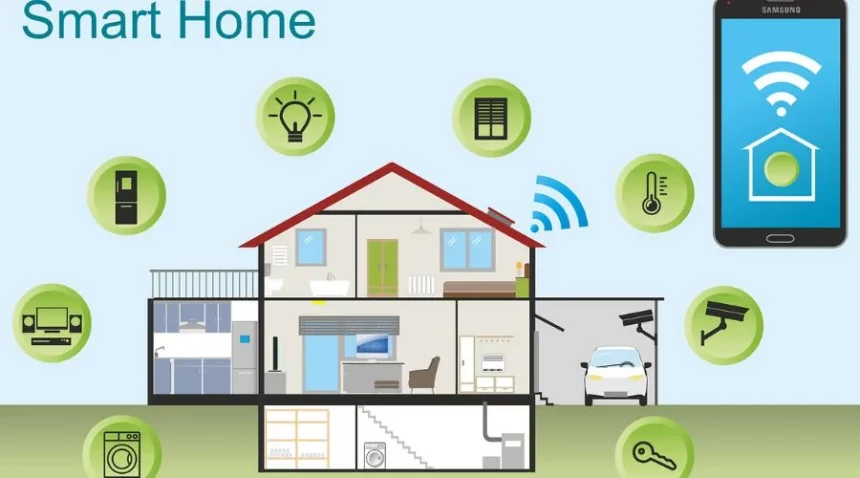Across the world, home security is an important issue for households. The future of home security is become more complicated and sophisticated thanks to advances in smart technology and artificial intelligence. Increased safety and simplicity are only two advantages that come with smart home security systems. This post will discuss the latest advances in smart home security and what they offer for homeowners.
What is smart technology in home security?
Smart home security systems use advanced technology to provide homeowners with greater security and control. These systems are designed to be easy to use and offer a range of features, including motion detection, remote monitoring, and facial recognition. They can be accessed and controlled from anywhere using a smartphone or tablet. Smart home security systems also integrate with other smart devices in the home, such as smart locks and cameras, to provide a complete security solution.
Benefits of smart home security systems
Smart home security systems offer a range of benefits over traditional security systems. Firstly, they are easy to use and can be controlled from anywhere using a smartphone or tablet. This means homeowners have greater control over their security and can monitor their home even when they’re not there. Smart home security systems also offer a range of features, including motion detection, facial recognition, and voice control. These features provide greater security and convenience for homeowners.
Another benefit of smart home security systems is that they can integrate with other smart devices in the home. For example, smart locks and cameras can be integrated with a smart home security system to provide a complete security solution. This means that homeowners can control all of their smart devices from one central app, making it easier to manage their home security.
- Advertisement -
AI and machine learning in home security
Artificial intelligence and machine learning are playing an increasingly important role in home security. AI algorithms can be used to detect unusual activity in the home, such as unexpected motion or the presence of an unknown person. These algorithms can also be used to analyze security footage and identify potential threats.
Machine learning is also being used to improve the accuracy of smart home security systems. By analyzing data from sensors and cameras, machine learning algorithms can learn to recognize patterns and identify potential threats. This means that smart home security systems can become more accurate over time, providing greater security for homeowners.
Current trends in the home security industry
The home security industry is constantly evolving, with new trends and innovations emerging all the time. One of the biggest trends in home security is the integration of smart home security systems with other smart devices in the home. This means that homeowners can control all of their smart devices from one central app, making it easier to manage their home security.
Another trend in home security is the use of facial recognition technology. This technology can be used to identify people entering the home and can even be used to unlock smart locks. This provides greater convenience for homeowners and eliminates the need for keys.
Challenges to adopting smart home security systems
While smart home security systems offer many benefits, there are also some challenges to adopting these systems. One of the biggest challenges is the cost. Smart home security systems can be expensive, especially if they are integrated with other smart devices in the home. This can be a barrier for some homeowners.
Another challenge is the complexity of these systems. Smart home security systems require a certain level of technical knowledge to set up and use. This can be intimidating for some homeowners, especially those who are not tech-savvy.
Integrating smart home security with other smart devices
One of the biggest benefits of smart home security systems is their ability to integrate with other smart devices in the home. This means that homeowners can control all of their smart devices from one central app. For example, a smart security system can be integrated with a smart lock and camera system to provide a complete security solution.
Integrating smart home security with other smart devices also provides greater convenience for homeowners. For example, a smart security system can be programmed to turn on the lights when motion is detected, providing greater visibility and security.
Also Read: Unlocking the Future: How Smart Locks are Revolutionizing Home Security
Best smart home security systems on the market
There are many smart home security systems on the market, each with its own set of features and benefits. Some of the best smart home security systems include the Nest Secure, SimpliSafe, and Ring Alarm. These systems offer a range of features, including motion detection, remote monitoring, and voice control. They are also easy to use and can be controlled from anywhere using a smartphone or tablet.
Future predictions for home security technology
The future of home security technology is bright, with new innovations and advancements emerging all the time. One of the biggest trends in home security is the use of artificial intelligence and machine learning to improve the accuracy of smart home security systems. This means that these systems will become more sophisticated and intelligent over time, providing greater security for homeowners.
Another trend in home security is the use of drones. Drones can be used to patrol the perimeter of a home and provide real-time video feeds to homeowners. This provides an additional layer of security and can be especially useful for homeowners with large properties.
Conclusion
Smart home security systems offer a range of benefits over traditional security systems. They are easy to use, offer a range of features, and can integrate with other smart devices in the home. While there are some challenges to adopting these systems, the benefits far outweigh the costs. As technology continues to evolve, the future of home security will become more intelligent and sophisticated, providing greater security and peace of mind for homeowners.


